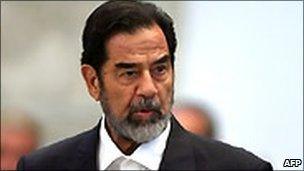Weir Group faces fine over Saddam sanctions breaches
- Published

Weir paid Saddam's government millions of pounds in illegal kickbacks
One of Scotland's largest companies has apologised for breaching UN sanctions on Iraq a decade ago, by doing business with Saddam Hussein's regime.
Glasgow-based engineering firm, Weir Group, has admitted charges of paying kickbacks to the dictator's government to secure lucrative business contracts.
It expects to receive a fine and pay a £13.9m confiscation order over corrupt deals under the Oil For Food scheme.
A decision is expected at the High Court in Edinburgh on Wednesday.
The court was told that Weir Group Plc admitted two charges of breaching United Nations sanctions, imposed on Iraq before the 2003 invasion.
Charges centred on contracts entered into under the Oil For Food programme between 2000 and 2002.
The programme was introduced by the UN to enable exports of Iraqi oil to take place, provided the cash was used for food, medicine and other humanitarian needs.
The court heard that subsidiary companies of Weir entered several contracts to supply goods to Iraqi public bodies during the Oil For Food programme.
They related to the supply of spare parts for pumps for Iraq's drinking water and oil infrastructures. The items were "essentials" and were permitted to be supplied during the programme.
The court was told that in 2000 the Iraqi Revolutionary Command Council, chaired by Saddam Hussein, decided that everyone supplying goods to Iraq had to pay a kickback to the Iraqi government in order to secure contracts.
Kickbacks - illicit payments made in return for facilitating a transaction - were to be 10% of the true value of the contract and were added to its price.
The supplier was then to claim the inflated price from UN-controlled funds, keeping the true price of the contract for themselves and paying the 10% back to the Iraqi government.
Advocate depute Dorothy Bain QC, for the Crown, told the court: "It is understood that many companies around the world capitulated to this demand and paid kickbacks to the Iraqi government in order to secure business. Such companies included Weir.
"Weir had a simple choice - not to pay the kickbacks and lose the contracts, or to pay the kickbacks and get the contracts. They chose the latter.
'Illegal kickbacks'
"Investigations have shown that Weir decided that the business was too profitable to lose, even though this meant paying illegal kickbacks to the Iraqi government.
"Group companies secured 16 contracts for which they were paid £34,340,204, by paying kickbacks of £3,104,527."
Ms Bain said Weir did not want to be seen paying kickbacks and made arrangements with an agent to do it.
She told the court: "Following instructions from Weir, Weir Pumps reimbursed the agent for making these payments and also paid him substantial sums of money, amounting to £1,427,152 for performing this service."
Ms Bain said the money was paid into a Swiss bank account.
"These illegal payments were disguised in the books of Weir Pumps as legitimate commission payments to an agent," she said.
The court heard the payment of the kickbacks by Weir and other companies meant that money allocated by the UN for humanitarian reasons went to the regime instead.
Ms Bain said an independent investigation set up by the UN into abuses of the Oil For Food programme estimated that about £1.5bn, which could have eased the suffering of the Iraqi people, was paid as kickbacks to Saddam Hussein's government.
Representing the group in court, Richard Keen QC said Weir Group was now a "very different company" to the one which existed in 2001.
He said the firm, "a major contributor to the Scottish economy", had brought in a code of conduct for its employees and had a whistle-blowing hotline for any employee who was concerned about possible breaches of its ethical code.
Mr Keen indicated that some senior figures within the group were present in court. He said none of them had direct knowledge of the events which form the subject of the court case.
Company apology
However, he said they accepted that they must be present in court on behalf of a company which committed "a series of criminal acts and, in doing so, betrayed the confidence of the public, its employees and its shareholders".
Mr Keen told the court: "The directors of Weir Group Plc wish to apologise for this chapter in the company's history and it is hoped that the company's prompt and unqualified plea will bring matters to a conclusion and remove uncertainty for its present employees and shareholders."
Chairman Lord Smith, who was present in court, said: "What happened was wrong. As I said in 2004, I am bitterly disappointed that this went on within the Weir Group.
"Since 2004, when we first disclosed the issue, we have radically overhauled procedures. A strong ethics culture is in place across the group and it is the reference point for everything we do."
- Published24 November 2010
- Published18 November 2010
- Published17 September 2010
- Published14 June 2010
- Published27 May 2010